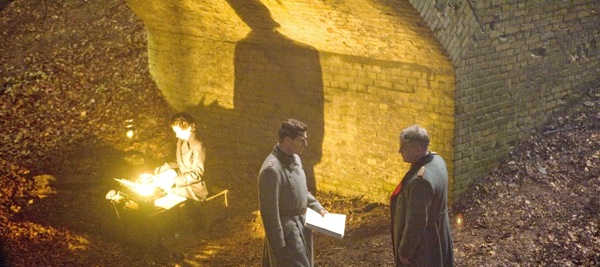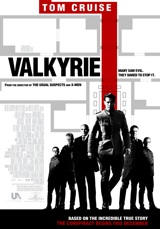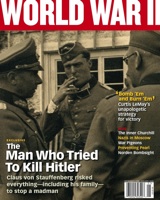Valkyrie – An Interview with Christopher McQuarrie

I guess I’m drawn to history because the main thing in writing a movie is to have a good ending, and with history I know how it ends.
On July 20, 1944, German army conspirators tried to end Europe’s nightmare by assassinating Adolf Hitler, an action they called Operation Valkyrie. Exposure or failure would bring terrible and far-reaching consequences.
That assassination attempt is the story behind Valkyrie, a new film from United Artists. Directed by Brian Singer (The Usual Suspects, X-Men) and starring Tom Cruise (the Mission Impossible series, Born on the Fourth of July), it has been described as "a thriller set during the war."
{default}The project began when Oscar-winning screenwriter Christopher McQuarrie (The Usual Suspects, The Way of the Gun) was taking a tour of Berlin while scouting locations for another movie. The tour concluded at the Bendlerblock where the conspirators were executed. The location was closed, but the tour guide told him about the events there and noted that the courtyard has within it the only memorial in Berlin to any German soldier of World War II.
McQuarrie turned to his companion and said, "That would make a great movie."
On December 26, 2008, that movie—Valkyrie—makes its nationwide debut. Recently McQuarrie, who also served as producer on the film, talked with ArmchairGeneral.com about bringing it to the screen.
ArmchairGeneral.com: I’ve read that you originally developed this screenplay along with Nathan Alexander, and that your long-time friend, director Brian Singer, got involved later. Is that correct?
Christopher McQuarrie: Yes. Nathan had done some playwriting in Seattle, but this was his first attempt at a screenplay. I told him to start with the research and not to worry about length or commercial considerations.
We decided very early on that we wanted to make a movie about the events of July 20, 1944, not a biography, but as we wrote it, it became clear that (Count Claus von) Stauffenberg was the central character.
ACG: This subject doesn’t lend itself to the sort of happy ending that is almost requisite in Hollywood. Did that create any problems in getting the film made?
CMQ: Once we finished the screenplay we put it in a drawer. We didn’t show it around to studios and producers as you would normally do. On the occasions when I would try to describe it to film financiers, I would only get as far as "It’s about German officers in World War II." They didn’t want to hear the rest.
Once Brian Singer got involved, no one needed to read the screenplay. I suggested to Brian that he take it to United Artists, where I had done some work.
ACG: There was a 1990 TV movie called the Plot to Kill Hitler, and the assassination attempt was also depicted in the 1951 movie The Desert Fox. How does Valkyrie compare or contrast with those?
CMQ: There’s also Night of the Generals, Winds of War, and two German films from the Fifties. Also, the 2004 TV movie Stauffenberg.
All those films focused on different aspects of the story. The assassination attempt was a subplot in The Desert Fox, for example. We were able to focus on the event of July 20, and that meant we were able to include more details than the others.
When you look at all these other movies, you see each one getting more detailed, you get a better understanding of the event with each one. In some of them, they don’t even get his eyepatch on the correct side of his face. One showed him with an entire arm missing. (Stauffenberg lost an eye, his right hand and part of his left hand during a Spitifire attack in North Africa. – ACG). By now, we’re at the level of getting the exact lighting fixtures, the exact fuses that Stauffenberg used. We’re at that level of detail in the movie.
In one office in the movie, there are props that were actually items in Hitler’s office. Items strangely found their way into the movie from collectors. People have all these collections of what is essentially Third Reich contraband, and normally they have to be pretty quiet about it. They’re anxious to be able to share their collections.
ACG: I don’t see Erwin Rommel listed among the characters in this film.
CMQ: Rommel doesn’t appear because he really wasn’t involved in the central events, as with many other important people in the German resistance. In early drafts (of the script) we included many people, but it felt like they were having cameos.
Stauffenberg’s brother Berthold, for example, had a major influence on Stauffenberg’s life. But because we really didn’t show Stauffenberg at home, we felt by having Berthold in the movie we were doing him a disservice because his role felt extremely diminished. It was something I wound up having to explain to his descendants.
 ACG: After some initial resistance, the German government gave permission to film in Bendlerblock where the conspirators were executed. Did it give you a thrill to know that the story you’d written would be filmed in part on historic sites?
ACG: After some initial resistance, the German government gave permission to film in Bendlerblock where the conspirators were executed. Did it give you a thrill to know that the story you’d written would be filmed in part on historic sites?
CMQ: It was moving. One of the things that struck me the most was a house we chose to film in. When we went to scout the location, I found a framed document in the otherwise empty house that said that was the house that had been used to conceal the bomb.
After three days of shooting, a member of the crew brought his grandmother to the set. She had pictures of herself in that house. Her father was executed as part of the conspiracy. We didn’t know that when we chose it as the film location, but here we were filming in the house.
ACG: The trailers show some intense scenes in North Africa, when the air attack that wounded Stauffenberg occurred. How long did it take to film those?
CMQ: We actually shot the North Africa sequence in three-and-a-half days. It was extremely well organized because it had been months in the planning. We finished shooting in Berlin in October ’07 and shot the Africa sequence in June of ’08.
Those scenes were filmed in Apple Valley, California. We had scouted Spain and Jordan trying to find terrain that resembled Tunisia. As it turned out, California actually had the best terrain.
ACG: I believe you once wanted to bring the story of Alexander the Great to the screen. Are you a history buff?
CMQ: I always have been. Alexander was my first crack at doing a historical movie. That’s where I developed the techniques of developing a movie based on historical events. I worked on it with Peter Buchman; it was his first screenplay. He went on to do Che.
I guess I’m drawn to history because the main thing in writing a movie is to have a good ending, and with history I know how it ends.
ACG: Once, in an interview with Cynthia Fuchs, you said that directing your own movie, The Way of the Gun, taught you that you "talk too much," that you have too much dialogue in your scripts. Valkyrie is a film that would seem to require a good bit of dialogue in order to help history-challenged viewers understand all that’s going on.
CMQ: Yeah, you would think that. We found ourselves paring it down, making it more and more efficient as we went. It’s remarkable how spare the dialogue is as the movie goes on. There are no big speeches.
ACG: You’re perhaps best known for writing noir crime thrillers. You even won an Oscar for The Usual Suspects. How did that background influence you in creating this history-based thriller?
CMQ: It’s interesting. All I wanted to do was get away from crime, do something different. When Valkyrie was over, I stepped back and realized I’d done the same thing all over again. What the conspirators attempted was, after all, a crime; many people disapproved of their actions. It’s a conspiracy story. More than anything, it’s a thriller. It’s not a biopic—it’s a conspiracy thriller.
(Wryly) Just when I think I’m out, they pull me back in.
ACG: Do you prefer writing a purely fictional story or working with one like this where the facts dictate much of the framework?
CMQ: Each one has its advantages, and each one has its drawbacks. I like the confinement of history and historical events. On the other hand, there’s something liberating about writing fiction. The closer you get to being historically accurate, the more criticism you get. People will focus on the three or four liberties you take instead of the hundreds you didn’t. In movies like Gladiator, which was just a passing nod to history, they don’t notice that.
I’m very happy with what I did. If I decided that what I wanted to do was a bloated bio pic, I could have added an hour following other characters, telling their backstory. There are lots of things you’d like to add, but even in a work of fiction I would have cut them out because they don’t play into the central story. What we left out were the things that distracted from the central thesis of the film, the events of July 20.
 For more on the real Claus von Stauffenberg – including information gleaned from interviews with his son about the horrors the family experienced following the attempt on Hitler’s life – read "The Man Who Tried to Kill Hitler" in the January 2009 issue of World War II magazine (available on newsstands December 16).
For more on the real Claus von Stauffenberg – including information gleaned from interviews with his son about the horrors the family experienced following the attempt on Hitler’s life – read "The Man Who Tried to Kill Hitler" in the January 2009 issue of World War II magazine (available on newsstands December 16).


Thank You very much for this site. I cannot remember when I singed up for this site, It has been awhile, but I come back here often. Thank You for the emails and the fsatenating articles that are on this site. Thank You for this site and this interview.
This is the first time I had the chance to read articles in this forum long after I have registered. In fact, I think this is the first time that I’ve open the forum again. I find the interview very fascinating specially for someone like me who is a history buff and an avid student of historical figures. I wonder if there are other features on Asian war generals like North Vietnamese General Giap. Cheers to Armchair General
Thank you so much for this interview! I can’t wait to see Valkyrie once it comes out in theatres. Stauffenberg was a real hero who was not afraid to do an unpopular and extremely dangerous thing; he was also a German war hero who fought with distinction in North Africa, as well as a Catholic—a combination that is rare to say the least, and not found often in WWII.
It is articles and interviews like this that make the Armchair General website such a great place. Thank you to all of the ACG magazine and website staff for all of the great work you do! I am very thankful to you today more than ever, on Thanksgiving. God bless!
Sincerely,
Alexander Wilson
Thank you very much to send me this message. I am a English learner. So I am very happy that I can join in this forum. It will do a lot to my English study. Thank you very much.
The web site Axis History Forum has a site on “German Genenerl Casualties” in which they discuss von Staufennbergs career, education (1936 Genral Staff Course) and backgroud.
I can’t wait for this movie to come out. They need to make more movies about WWII – least our future generations don’t forget this horrible war and repeat it!
Hilter was a mad man and should have never been in power but for every bad thing there is good that comes from it and I’m sure there was a reason for all of it.
Christopher McQuarrie – if your listening here are some future ideas for moves based on history.
The story of Saul or Paul from the Bible and his entire life – it would be a amazing and rare account for a movie. Trust me.
Maybe a movie about the “Winter War” in 1940 when the Soviets invaded Finland and how they defeated them beginning highly out-gunned and out-numbered.
A movie about the Nazi seige of Leningrad and how the Russian people survived almost four years of starvation in that city.
Just some ideas…………………..
It’s very telling of these people to discuss their motivations for making motion pictures, its almost the story within the story. Thanks for the interview. Love reading World War II
Personally, I thought the movie was amazing.
I’m not one for Tom Cruise (usually), but I liked this.
It was well written, well directed, and well cast (for the most part).
I cannot wait for this movie to come out on DVD.
This interview just added to my excitement. Great interview!
Sources. What were McQuarrie’s actual sources? Which ones out of many did he use? Why isn’t a history magazine asking him about his approach to and use of historical materials?
This interview reads like a puff piece from any dumb entertainment publication, not something that is appearing in a serious magazine for history buffs, who want to see serious topics dealt with with the care and attention that they deserve.
Right?
Ask the man real questions the next time.
For example, “the exact fuses that Stauffenberg used”. Who cares. Hollywood is famous for its overemphasis on trivial details of this sort, while getting the characterizations of the historical figures wrong.
Whose books did you use, fellah? Which records state the manufacturer of Stauffenberg’s fuses?
I am not and never have been a spammer. I am attempting to find the
name of a book Mrs. von Stauffenberg (Nina) wrote about what happened
to her and her daughter while kept in captivity during the time of her captivity and the birth of daughter while in captivity.
born. I would very much like to read the book since I am a great admirer
of both Nina and Claus and their family. It is difficult to get the book here
in America without the name of the book and the publisher in Germany.
I also want to make sure my sons and their wives can read this book.
If you ca n be so kind, I would be very grateful!
I read of the placing of a plaque of honor placed in the German square where Claus was shot, at least according to our information, and we as Americans were very to hear of this honor bestowed on him and how it
has been a blessing to German people.
Thank you so much for anything you can to inform me of Nina’s book title.
Suzanne, are you perhaps thinking of the book written by Nina?
http://www.new-books-in-german.com/english/287/217/217/129002/design1.html